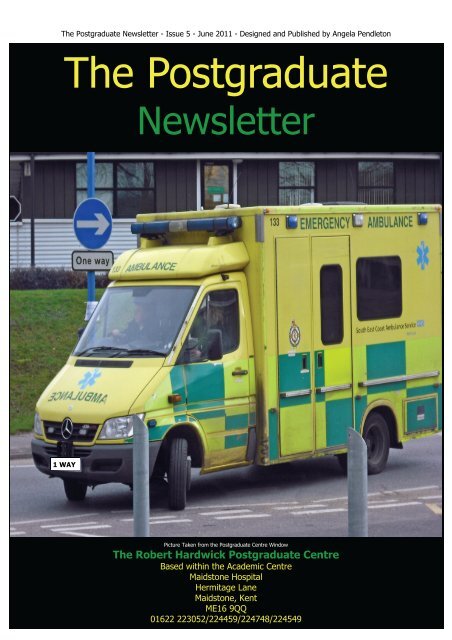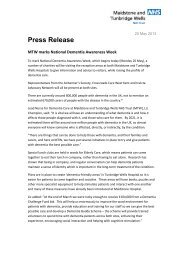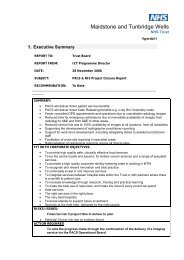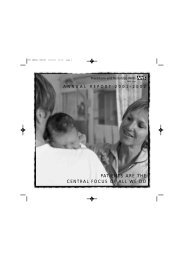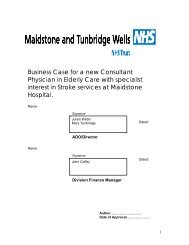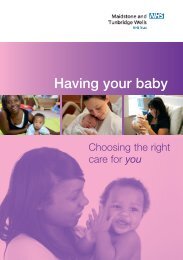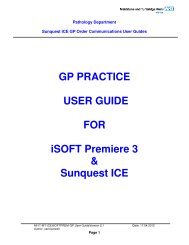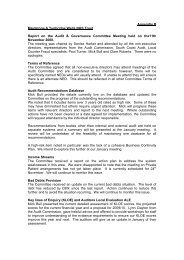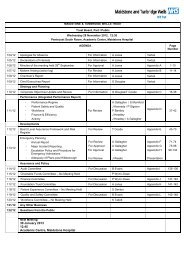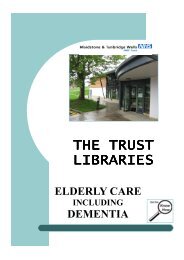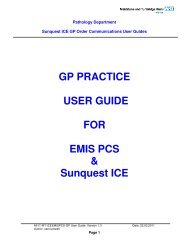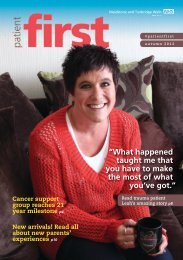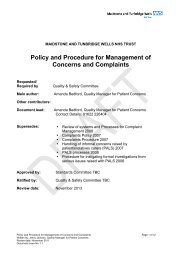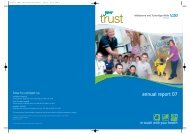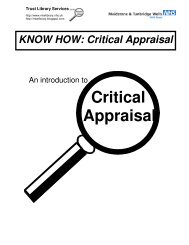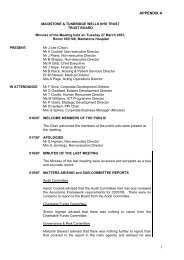The Postgraduate Newsletter - Maidstone and Tunbridge Wells NHS ...
The Postgraduate Newsletter - Maidstone and Tunbridge Wells NHS ...
The Postgraduate Newsletter - Maidstone and Tunbridge Wells NHS ...
You also want an ePaper? Increase the reach of your titles
YUMPU automatically turns print PDFs into web optimized ePapers that Google loves.
<strong>The</strong> <strong>Postgraduate</strong> <strong>Newsletter</strong> - Issue 5 - June 2011 - Designed <strong>and</strong> Published by Angela Pendleton<br />
<strong>The</strong> <strong>Postgraduate</strong><br />
<strong>Newsletter</strong><br />
1 WAY<br />
Picture Taken from the <strong>Postgraduate</strong> Centre Window<br />
<strong>The</strong> Robert Hardwick <strong>Postgraduate</strong> Centre<br />
Based within the Academic Centre<br />
<strong>Maidstone</strong> Hospital<br />
Hermitage Lane<br />
<strong>Maidstone</strong>, Kent<br />
ME16 9QQ<br />
01622 223052/224459/224748/224549
<strong>The</strong> <strong>Postgraduate</strong> <strong>Newsletter</strong> - Issue 5 - June 2011 - Designed <strong>and</strong> Published by Angela Pendleton<br />
Page 3<br />
Page 4<br />
Page 5<br />
Page 6<br />
Page 7<br />
Page 8<br />
Page 9<br />
Page 10<br />
Page 11<br />
Page 12<br />
Page 13<br />
Page 14<br />
Page 15<br />
Page 16<br />
Page 17<br />
Page 18<br />
Page 19<br />
Page 20<br />
Dr Chris Thom ‐ Clinical Tutor at <strong>Maidstone</strong> <strong>Postgraduate</strong> Centre<br />
Celia Cusworth ‐ Medical Education <strong>and</strong> Centre Manager <strong>Maidstone</strong> Hospital<br />
Dr Paul Moran ‐ Simulation Lead “A New Way of Training” & Library <strong>and</strong> Knowledge Services<br />
Dr Elizabeth Hill ‐ SAS Tutor for MTW & Dr Jonty West ‐ GP Programme Director at <strong>Maidstone</strong><br />
Najma Amir—Centre Manager IMACS & Nick Winter ‐ Medical Education Manager Psychiatry<br />
Children in Need 2010<br />
<strong>The</strong> Art Competition<br />
Robert Hardwick & Pentecost Medal 2010‐2011 by Dr George Bird Former Clinical Tutor<br />
Teaching <strong>and</strong> study days & Mr Dib Datta, Cons Obs & Gynae—GP Refresher Day<br />
Mr Lee David ‐ T&O Regional Circuit Meeting & Dr Syed Husain Third Thoracic Ultrasound Course<br />
Dr Ben Warner ‐ Specialty Registrar at <strong>Maidstone</strong> 2010‐2011<br />
2011 Doctors Summer Ball Poster & Dr Bhavna Batohi ‐ F2 <strong>and</strong> Foundation Faculty Rep<br />
Dr Jennifer Pang, Core Medical Trainee at <strong>Maidstone</strong> ‐ Learning to Make a Difference<br />
Sarah Gregson ‐ <strong>The</strong> Kangaroo Research project<br />
Dr Tony Jones ‐ GP Tutor “Collaborative Commissioning” & Mr Akbar Soorma ‐ Foundation Careers Advisor<br />
Dr Samantha Harmer, F1 Trainee ‐ Medical Student OSCE Exams<br />
Dr Dina El‐Hamamsy ‐ “Survey of Attendance at postgraduate meetings 2009/2010” & Domestic Charity Football<br />
<strong>The</strong>re's only “one way” to the Academic centre<br />
<strong>The</strong> <strong>Postgraduate</strong> Centre Girls<br />
Celia Cusworth<br />
Medical Education &<br />
Centre Manager<br />
Angela Pendleton<br />
<strong>Newsletter</strong> Publisher & Editor<br />
<strong>and</strong> <strong>Postgraduate</strong> Coordinator<br />
Victoria Fuller<br />
Receptionist &<br />
<strong>Postgraduate</strong> Coordinator<br />
Stephanie Joyce<br />
Faculty Administrator<br />
K&S Mon/Tue<br />
<strong>Maidstone</strong> Wed/Thu/Fri<br />
2<br />
Sheena Harris<br />
Office Manager<br />
Lynne Cox<br />
Undergraduate Coordinator
<strong>The</strong> <strong>Postgraduate</strong> <strong>Newsletter</strong> - Issue 5 - June 2011 - Designed <strong>and</strong> Published by Angela Pendleton<br />
Dr Chris Thom<br />
Clinical tutor<br />
the Robert Hardwick <strong>Postgraduate</strong> Centre<br />
<strong>Maidstone</strong> Hospital<br />
Pictured Right<br />
Last Minute.Thom at Number 10<br />
A year ago we were proudly celebrating the opening of the Academic Centre. We had two glittering opening<br />
ceremonies – first for IMACS, then for the Centre itself with our new MP, Helen Grant. At that ceremony I promised,<br />
rather rashly, that we would make full use our new facilities to give an outst<strong>and</strong>ing educational experience to our<br />
trainees. Have I kept my promise?<br />
Well, we have certainly been using the Centre intensively. On top of our regular teaching sessions <strong>and</strong> the very<br />
exciting IMACS programme, we have hosted a large number of training <strong>and</strong> study days in a wide variety of fields,<br />
meetings that we were simply too small to accommodate in the past. We are increasingly known in the region<br />
(<strong>and</strong> beyond) as a high quality venue for educational events. As well as putting <strong>Maidstone</strong> on the map, this enables<br />
us to make all sorts of useful contacts with our visitors. I have already recruited a couple of eminent speakers to<br />
contribute to our Friday lunchtime lecture series after a chance conversation in the Centre.<br />
Our vision for our clinical skills lab has been completed by the arrival of SimMan. This high fidelity simulator has<br />
opened up what is for us an entirely new field in medical education. By placing our trainees in realistic simulated<br />
scenarios, we are able to prepare them for the real life challenges they will be facing. One of our F1s reported being<br />
able to deal effectively with a difficult clinical situation because she had done something very similar in the skills lab<br />
the day before. Over the coming months we will be extending simulation training to F2s, core medical trainees,<br />
anaesthetic trainees <strong>and</strong> many other groups.<br />
One unplanned bonus of our new auditorium is that it makes an excellent cinema. <strong>The</strong> <strong>Maidstone</strong> Hospital Film<br />
Club has shown its first film <strong>and</strong> is planning an interesting <strong>and</strong> entertaining monthly programme.<br />
As Clinical Tutor I am always looking for ways to stimulate our corporate academic life. For many years we have run<br />
two presentation prize competitions for doctors in training – the Alan Pentecost <strong>and</strong> the Robert Hardwick.<br />
I am delighted to report that the st<strong>and</strong>ard of entries is getting higher <strong>and</strong> higher; the hardest task is whittling them<br />
down to three finalists. We run an art competition for Trust staff, <strong>and</strong> again get entries of very high quality. I am<br />
now planning two new competitions. First the <strong>Postgraduate</strong> Centre Trustees have agreed to fund (to a maximum of<br />
£5000) a research bursary to enable a doctor in training (or a group containing at least one medical trainee) to start a<br />
research project. This will be run by the Trust’s research department, with a competitive application process in the<br />
autumn. Secondly I am planning to hold a competition for a practical innovation introduced by a trainee, rather<br />
along the lines of the Royal College of Physicians’ Learning to Make a Difference programme.<br />
So, all in all, I think I can truthfully claim that academic life is flourishing in <strong>Maidstone</strong> Hospital as never before.<br />
We cannot rest on our laurels. <strong>The</strong>re are many challenges ahead, not least that of service configuration, which will<br />
see several departments moving away from <strong>Maidstone</strong>. But I am confident that we can meet these challenges <strong>and</strong><br />
continue to offer a stimulating <strong>and</strong> supportive educational environment for our very motivated trainees.<br />
3
<strong>The</strong> <strong>Postgraduate</strong> <strong>Newsletter</strong> - Issue 5 - June 2011 - Designed <strong>and</strong> Published by Angela Pendleton<br />
Celia Cusworth<br />
I can’t believe another year has passed since the <strong>Postgraduate</strong> Centre extension work took place <strong>and</strong> the new<br />
Academic Centre was built. We have seen a lot of changes in that time <strong>and</strong> the Centre is noticeably busier <strong>and</strong> with<br />
many evening <strong>and</strong> weekend meetings now taking place.<br />
An exciting new addition to the Centre has been the installation of a Simulation Suite, where trainees can practice<br />
their clinical skills under the supervision of a faculty of consultant trainers, headed by Dr Paul Moran, Consultant<br />
Anaesthetist at <strong>Maidstone</strong>. A Sim‐Man was purchased with Deanery funds <strong>and</strong> a substantial contribution from the<br />
SIFT fund administered by Dr Bim Bhaduri, Undergraduate Tutor for <strong>Maidstone</strong>. It is a Foundation School m<strong>and</strong>atory<br />
requirement that all F1s in the Trust should have completed simulation training before commencing F2 training, <strong>and</strong><br />
consequently the faculty has organised training of the F1s on both sites as a priority. Other specialty leads have<br />
shown an immense interest in using the facilities for their own trainees <strong>and</strong> are currently liasing with Paul on how to<br />
run the training.<br />
A Film Society has been set up recently in the Centre in which all Trust employees are invited to attend free of<br />
charge. Films will be shown on a regular basis in the evening <strong>and</strong> staff can mingle together to watch <strong>and</strong> then<br />
discuss the film afterwards over a coffee. <strong>The</strong> first film shown was “<strong>The</strong> Third Man”. Please forward any<br />
suggestions for future films to the <strong>Postgraduate</strong> Centre. Posters advertising the next showing will be displayed<br />
shortly throughout the Trust <strong>and</strong> through the Trust publicity office.<br />
<strong>The</strong> <strong>Postgraduate</strong> <strong>and</strong> Library teams organised a Coffee morning <strong>and</strong> raffle this year in aid of the “Children in Need”<br />
charity. A healthy sum of some £450 was raised for this worthy cause. Thanks go to Vicki for arranging this successful<br />
event.<br />
Vicki Fuller joined the Postgrad team last August. She mans the Reception Desk <strong>and</strong> welcomes all callers to the<br />
Centre. She is responsible for room bookings <strong>and</strong> included in her role is that of “champion” to Core Medical <strong>and</strong><br />
Oncology trainees within the Trust. Apart from their usual heavy workload Sheena Harris continues to “champion”<br />
the F1 trainees with Angela championing the F2s. Lynne runs the undergraduate programme for a large number of<br />
medical students who opt to do electives at <strong>Maidstone</strong>, <strong>and</strong> has also taken on the important role of Simulation<br />
Administrator.<br />
Again, I would like to thank the <strong>Postgraduate</strong> team for all their hard work this year. By pulling together as a team we<br />
have been able to deliver the high st<strong>and</strong>ard of service that the KSS Deanery <strong>and</strong> the Trust expect of us in our<br />
increasingly dem<strong>and</strong>ing environment. Team is the <strong>The</strong>me!<br />
Celia Cusworth<br />
Medical Education Manager<br />
<strong>Maidstone</strong> Hospital<br />
<strong>Postgraduate</strong> Centre<br />
Left to right: Sheena Harris, Stephanie Joyce, Vicki Fuller, Celia Cusworth, Angela Pendleton, Lynne Cox<br />
<strong>and</strong> Kelie Jest Psychiatry Administrator.<br />
4
A New way of Training<br />
<strong>The</strong> <strong>Postgraduate</strong> <strong>Newsletter</strong> - Issue 5 - June 2011 - Designed <strong>and</strong> Published by Angela Pendleton<br />
Dr Paul Moran<br />
Simulation Faculty Lead<br />
<strong>The</strong> way we train junior doctors <strong>and</strong><br />
medical students has undergone massive<br />
changes over the last few years. We have<br />
already moved away from the<br />
apprenticeship to deliver more structured<br />
competency based training. Going h<strong>and</strong> in<br />
h<strong>and</strong> with this is simulation training.<br />
This year we have managed to convert the<br />
Clinical Skills room <strong>and</strong> the Robert<br />
Hardwick room into a Simulation Suite. This<br />
incorporates an impressive audiovisual<br />
system that links not only these rooms but<br />
also the Alan Pentecost <strong>and</strong> Marie South<br />
rooms. This enables c<strong>and</strong>idates to watch<br />
simulation scenarios unfolding away from<br />
the action. We have had three high fidelity<br />
patient simulators delivered. This includes<br />
one adult manikin, the SimMan 3G, <strong>and</strong><br />
two paediatric manikins, the Gaumard<br />
paediatric <strong>and</strong> newborn HALs. <strong>The</strong>se<br />
manikins are state of the art technology.<br />
<strong>The</strong>y are all linked to the control room<br />
wirelessly <strong>and</strong> the faculty is able to control<br />
many different signs <strong>and</strong> symptoms as well<br />
as all the physiological variables. <strong>The</strong><br />
manikins even respond to treatment <strong>and</strong><br />
drugs in the appropriate manner. All of the<br />
manikins <strong>and</strong> the conversion of Simulation<br />
Suite was made possible by funding<br />
provided by Dr Bim Bhaduri, the<br />
Undergraduate Tutor, from the SIFT fund.<br />
<strong>The</strong> Simulation Faculty has been hard at<br />
work developing courses for different<br />
doctors <strong>and</strong> nurses at MTW. This includes<br />
writing realistic clinical scenarios <strong>and</strong><br />
programming them on to the computer.<br />
<strong>The</strong> first course that has been up <strong>and</strong><br />
running is the m<strong>and</strong>atory Foundation year<br />
1 simulation training. This has meant that<br />
we haven’t had to send our junior doctors<br />
to London for the first time (<strong>and</strong> we don’t<br />
have to pay for it!). We first opened the<br />
doors for training on the 10 th March<br />
(although the official opening wasn’t until<br />
7 th April) <strong>and</strong> since then we have managed<br />
to complete the simulation training of over<br />
half the F1s across the Trust. We now aim<br />
to have simulation courses for a number of<br />
different specialties including Medicine <strong>and</strong><br />
Surgery, Paediatrics, Anaesthetics <strong>and</strong><br />
Obstetrics up <strong>and</strong> running by the next<br />
academic year. <strong>The</strong> aim is to make these<br />
courses as multidisciplinary as possible <strong>and</strong><br />
therefore making sure all Doctors, Nurses,<br />
Midwives <strong>and</strong> ODPs are working towards a<br />
common goal of improving patient safety<br />
<strong>and</strong> care. Watch this space!<br />
Paul Moran<br />
Simulation Gr<strong>and</strong> Opening<br />
Pictures which took place on 7th<br />
April 2011. Pictures include the<br />
Chief Executive ,<strong>Postgraduate</strong> staff<br />
<strong>and</strong> attendees training in the<br />
Simulation suite<br />
Library <strong>and</strong> Knowledge Services<br />
Emma Aldrich Knowledge Manager<br />
Ann Foreman Systems Librarian<br />
David Copsey Head of Library <strong>and</strong> Knowledge Services<br />
Increasing the number of e‐journals <strong>and</strong><br />
e‐books we purchase <strong>and</strong> ensuring that<br />
these are easily accessible via Athens.<br />
Search for titles at:<br />
www.southeastlibrarysearch.nhs.uk, <strong>and</strong><br />
access with your Athens username.<br />
Library staff <strong>and</strong> users are continuing to<br />
enjoy working in our enlarged, refurbished<br />
premises, <strong>and</strong> the past year has seen a<br />
number of developments.<br />
<strong>The</strong>se include:<br />
Issuing FREE Trust encrypted memory<br />
sticks to MTW employees who join the<br />
library.<br />
Developing a new knowledge service,<br />
Netvibes, enabling us to pull dynamic<br />
resources from websites, journals,<br />
newspapers, MTW staff teaching<br />
materials, chat forums all into one place:<br />
www.netvibes.com/mtwlibrary ‐ Want a<br />
tab for your department/ speciality? Let us<br />
know! (Large GP/Primary Care section now<br />
live)<br />
Moving steadily towards greater provision<br />
of e‐resources to provide 24/7 access to<br />
evidence; this year we have purchased<br />
BMJ Case Reports <strong>and</strong> Up‐To‐Date. See the<br />
library website for access details.<br />
www.mtwlibrary.nhs.uk<br />
We continue to offer FREE membership to<br />
MTW, KMPT, <strong>NHS</strong> West Kent, SEC<br />
Ambulance Trust. 24/7 access to the<br />
library is still a very popular service –<br />
collect a fob from staff during our opening<br />
hours to make use of us overnight <strong>and</strong> at<br />
weekends. ALL 15 PCs can be accessed via<br />
your MTW login OR a generic username<br />
<strong>and</strong> password, <strong>and</strong> the rolling programme<br />
of replacement/ reimaging is having a<br />
radical effect on PC speeds. Come in <strong>and</strong><br />
try them out!<br />
FREE training is available to ALL members<br />
of the library, in the library OR in your<br />
workplace at times <strong>and</strong> dates to suit you.<br />
Groups welcome! Please contact Alison<br />
Millis for bookings: alison.millis@nhs.net.<br />
Library <strong>and</strong> Knowledge Services were<br />
assessed as fully compliant in 59 of 61<br />
criteria at the 2011 Deanery Contract<br />
Review. <strong>The</strong> remaining actions are in<br />
progress.<br />
5<br />
Pictures above of <strong>Maidstone</strong> Hospital Library
<strong>The</strong> <strong>Postgraduate</strong> <strong>Newsletter</strong> - Issue 5 - June 2011 - Designed <strong>and</strong> Published by Angela Pendleton<br />
Dr Elizabeth Hill<br />
SAS Tutor<br />
At the time of writing, I am looking forward to our second trust wide SAS afternoon next week.<br />
Following on from comments from the SAS group, this has primarily a clinical focus this year, with topics<br />
including simulation, diabetes, sepsis, <strong>and</strong> radiology from local experts, as well as presentations from<br />
Miad on the benefits of their work with SAS doctors in London, <strong>and</strong> a chance to take some advice on<br />
pension planning from Mike Willoughby of Chase de Vere‐‐something for everyone there I hope, as well<br />
as a chance to socialise <strong>and</strong> chat to colleagues in different areas of the Trust.<br />
Over the summer our focus will be on preparing for the appraisal round coming in the Autumn. Last<br />
year saw a huge leap in the number of SAS doctors taking part in the Trust appraisal process ‐‐ <strong>and</strong><br />
importantly an improvement in the st<strong>and</strong>ard of individual appraisals, bringing SAS doctors towards the<br />
level of consultant appraisals. We also built a core of 7 SAS appraisers ‐ a great achievement, especially<br />
considering that some Trusts still exclude SAS doctors from becoming appraisers.<br />
Graham Russell, our appraisal lead will be running update courses for appraisers, <strong>and</strong> I have arranged to<br />
purchase on‐line training on appraisal, to help those still a little unsure of the process. Additionally, we<br />
will be running workshops to help answer individual queries, <strong>and</strong> I plan to offer portfolio development<br />
clinics.<br />
A busy <strong>and</strong> exciting Summer <strong>and</strong> Autumn ahead!<br />
Elizabeth Hill SAS Tutor<br />
Dr Jonty West<br />
GP Programme Director<br />
I started as one of the three Programme Directors of the <strong>Maidstone</strong> GP Vocational Training Scheme in<br />
October, alongside Richard Laurent & Mike Strachan. I took over from Annie Walker, <strong>and</strong> it turns out<br />
that filling her shoes is proving to be a big challenge!<br />
<strong>The</strong> VTS runs a half day release educational programme on Wednesday afternoons through the year for<br />
GP Trainees in their third (final year), <strong>and</strong> also for those second year trainees in General Practice posts.<br />
<strong>The</strong> topics we have covered this year include clinical, management, ethics, as well as several sessions<br />
with actors, working on communication <strong>and</strong> consulting skills in preparation for the MRCGP Clinical Skills<br />
Assessment (CSA).<br />
I have greatly enjoyed my first taste of being a Programme Director.<br />
Unfortunately for me, the hard work is really just about to start – Annie had left me a draft timetable for<br />
this year, now I have to prepare for next year!!<br />
Anyone interested in training to be a GP can usually find me or Richard at the <strong>Postgraduate</strong> Centre on<br />
Wednesday afternoons.<br />
6<br />
Jonty
<strong>The</strong> <strong>Postgraduate</strong> <strong>Newsletter</strong> - Issue 5 - June 2011 - Designed <strong>and</strong> Published by Angela Pendleton<br />
Najma Amir<br />
Centre Manager<br />
IMACS<br />
First year of IMACS<br />
(International Minimal Access Centre<br />
for Surgery)<br />
We had official opening of IMACS on 28th<br />
May 2008. <strong>The</strong> first year was a busy <strong>and</strong> very<br />
exciting year developing the pathways, team<br />
building, website, external <strong>and</strong> internal links.<br />
Our website www.imacs.org.uk was<br />
launched last month. <strong>The</strong> site truly reflects<br />
the genius <strong>and</strong> great imagination of Clare<br />
Grove <strong>and</strong> expertise of ARC web designers<br />
who have jointly done a wonderful job.<br />
While we have done our best to provide the<br />
material for the website , this will evolve<br />
with time. We would like to engage more<br />
specialities <strong>and</strong> departments as well as<br />
clinicians <strong>and</strong> nurses on the website. Please<br />
contact me to discuss your ideas <strong>and</strong><br />
suggestions for involvement with IMACS.<br />
Our very successful course in Microbubble<br />
technique was led by Mr P Jones, Dr Ali Sever<br />
<strong>and</strong> his team <strong>and</strong> was not only very well<br />
attended but was hailed a pioneering course<br />
in the speciality. Mr O Devaja <strong>and</strong><br />
Mr A Papadopoulos led the Gynaecology<br />
courses. We have not only run courses <strong>and</strong><br />
meetings from our centre but also offered<br />
teaching <strong>and</strong> training on the international<br />
scene, which has brought the recognition to<br />
MTW which it thoroughly deserves. We will<br />
have our first group of international<br />
surgeons visiting IMACS, MTW from Pakistan<br />
this summer for Laparoscopic training. We<br />
will also be linking up with AIMS Centre ITALY<br />
in June to demonstrate live Minimal Invasive<br />
Oesophageal surgery.<br />
A Minimal Invasive Oesophagectomy<br />
international meeting is planned for July this<br />
year with an international faculty. Two<br />
regional courses are announced in<br />
Laparoscopic Cholecystectomy <strong>and</strong><br />
Laparoscopic Nissen Fundoplication. After<br />
approval from Dr Elizabeth Hill, SAS tutor<br />
MTW we have circulated the programme to<br />
the regional SAS doctor’s in addition to<br />
registrars. Dr Hill has championed the cause<br />
of SAS doctors education <strong>and</strong> training. We<br />
have not only agreed to offer Laparoscopic<br />
training courses at a reduced course fees to<br />
the SAS doctors but also agreed to select<br />
appropriately motivated <strong>and</strong> skilled doctors<br />
attending these courses <strong>and</strong> include them in<br />
our faculty. This will offer them a new<br />
dimension in their work place <strong>and</strong> enhance<br />
their teaching, training <strong>and</strong> learning<br />
experience. This year we have announced<br />
the first annual friendly T/20 cricket match<br />
between IMACS <strong>and</strong> MTW management<br />
teams on 2nd of July as "Heart burn <strong>and</strong><br />
Barrett's Oesophagus awareness day". This<br />
will be a family day out for the players <strong>and</strong><br />
the spectators <strong>and</strong> the funds raised will be<br />
donated to the local charity for homeless ‐<br />
"<strong>Maidstone</strong> Christian Care" by our Chief<br />
Executive Mr Glen Douglas. This will be just<br />
another small contribution by the staff of<br />
MTW towards the community in addition to<br />
its routine services.<br />
Once again our "super heroes ‐ the League of<br />
Friends" led by Mrs Joyce Langton are<br />
helping us with the event organisation <strong>and</strong><br />
their services to the hospital are recognised,<br />
appreciated <strong>and</strong> admired by everyone in the<br />
Trust.<br />
I am also pleased to announce that since<br />
April I have a complement of full team with<br />
Mrs Sue Weston, secretary <strong>and</strong> Mr Marcelo<br />
Wilson Barnett, AV technician joining IMACS.<br />
This has helped us immensely to speed up<br />
the organisation <strong>and</strong> development of courses<br />
<strong>and</strong> other activity in the centre.<br />
Nick Winter<br />
MEM<br />
<strong>The</strong> facilities at the Academic Centre are now state‐of‐the‐art <strong>and</strong> the educational opportunities available to trainees second to<br />
none. We take many GP <strong>and</strong> Foundation Trainees on 4 month rotations in Psychiatry <strong>and</strong> Celia Cusworth <strong>and</strong> myself <strong>and</strong> our<br />
respective LFGs are talking about how we can work together to provide simulation training to all trainees. From a psychiatric<br />
perspective, it is good for our core trainees to maintain their core medical skills whilst trainees with no experience of working in<br />
mental health can surely benefit from simulated sessions on, for example, post‐operative psychosis. After all, physical illness does<br />
not preclude mental illness <strong>and</strong> vice versa.<br />
Another area where we work together is in the provision of mock OSCEs for medical students organised by Lynne Cox. A psychiatry<br />
station is always needed <strong>and</strong> our core trainees are more than willing to step in <strong>and</strong> fill the examiner role. My questionable acting<br />
skills have also been occasionally required to role play various mental disorders – which always makes for an interesting day at<br />
work!<br />
Should anyone have any queries about working in Psychiatry please drop by my office on the first floor of the Academic Centre or<br />
give me a call on 01622 222034. <strong>The</strong>re is a notice‐board outside my office with contact details for the team should no one be<br />
available to answer your query.<br />
Nick Winter<br />
Medical Education Manager – Psychiatry<br />
Kent & Medway <strong>NHS</strong> & Social Care Partnership Trust<br />
7
<strong>The</strong> <strong>Postgraduate</strong> <strong>Newsletter</strong> - Issue 5 - June 2011 - Designed <strong>and</strong> Published by Angela<br />
Wow £430.05 was raised for Children In Need last year by the Academic Centre!<br />
How did we do this....?<br />
On the 19 th November the Academic Staff organised a bake sale <strong>and</strong> raffle. This took place in the main dining area,<br />
<strong>and</strong> doors opened at 11am. Member of staff from the <strong>Postgraduate</strong> Centre <strong>and</strong> Library baked cakes <strong>and</strong> the<br />
response was amazing, we were overloaded by cakes <strong>and</strong> goodies from Cup Cakes to Victoria Sponge Cakes to<br />
Chocolate Chip Cookies. Even some <strong>Maidstone</strong> Hospital Doctors got creative in their kitchens!<br />
But we didn’t stop there....<br />
Vicki Fuller of the <strong>Postgraduate</strong> Centre also organised a raffle for the afternoon. She wrote off to local companies<br />
begging for donations. Her hard work paid off <strong>and</strong> the outcome was amazing!<br />
Here is a list of some of the prices that could have been won by you:<br />
Meal for 2 at the Duke of Wellington Restaurant, <strong>Maidstone</strong><br />
Free wash, Cut & Finish from Rush Hair, <strong>Maidstone</strong><br />
Stainless Steel outdoor BBQ from Tesco Express, Gillingham<br />
£30 gift certificate from George Vaults Wine Bar, Rochester<br />
Free fish & chips for 2 from Deep Blue, Hermitage Lane, <strong>Maidstone</strong><br />
£10 gift voucher from Sainsbury’s, <strong>Maidstone</strong><br />
Bottle of Vodka donated by the Three Sisters Mobile Bar Company, Gillingham<br />
White framed mirror donated by Bell Glass, Gillingham<br />
Bottle of Whiskey & Chocolates donated by League of Friends, <strong>Maidstone</strong> Hospital<br />
And last but not least a cuddly Teddy Bear donated by Ken & Shirley Spree (patients of <strong>Maidstone</strong> Hospital)<br />
<strong>The</strong> raffle took place at around 1.30pm <strong>and</strong> there was about 60 anxious doctors, nurses <strong>and</strong> admin staff all waiting to<br />
see if there number had been picked out of the hat...Led by Dr Thom the raffle was under way! <strong>The</strong> atmosphere was<br />
brilliant, a lot of laughter <strong>and</strong> fun was had by all!!<br />
Here are some of the lucky winners:<br />
Kelie Jest (Psych’s) won the BBQ<br />
Sheena Harris (Postgrad Centre) won the free Wash, Cut & Finish<br />
Dr Jappie (Consultant Anaesthetist) won the meal for 2 at Duke of Wellington<br />
Dr Garth Somerville (Director of Medical Education) won the free Fish & Chips<br />
Darren Yates (Communications Manager) won the tin of Roses<br />
Dr Shaniel Sonecha (F1 Doctor) won the hair removal kit<br />
Dr Fred Pink (CT1 Doctor) won the bottle of Whiskey<br />
Pictured above is Vicki Fuller from the <strong>Postgraduate</strong> Centre <strong>and</strong> Stephanie Joyce Faculty Administrator sampling the products! Also pictured are the donated prizes <strong>and</strong><br />
cakes made by the Academic Centre staff <strong>and</strong> many of the junior doctors including Dr Mira Mikhail. Dr Michael Flitman, Dr Holly Merrick & Dr Grace Chew<br />
8
<strong>The</strong> <strong>Postgraduate</strong> <strong>Newsletter</strong> - Issue 5 - June 2011 - Designed <strong>and</strong> Published by Angela Pendleton<br />
1st Place<br />
Painting/Drawing Section<br />
Alex<strong>and</strong>ra Holmes<br />
“Cabbages & Clementines”<br />
2nd Place<br />
Painting/Drawing Section<br />
Linda Sayer<br />
“Remember”<br />
1st Place<br />
Photography Section<br />
Susannah Lowe<br />
“With your name on it”<br />
2nd Place<br />
Photography Section<br />
Keith Anderson<br />
“Nosey neighbours”<br />
2010<br />
Entries<br />
<strong>The</strong> Robert Hardwick <strong>Postgraduate</strong> Centre annually holds an art competition which is open to all staff, across site to<br />
enter. <strong>The</strong> competition is divided into two sections, painting/drawing & photography . 1st <strong>and</strong> 2nd place cash prizes<br />
are awarded to the winners.<br />
This year, due to the refurbishment <strong>and</strong> extension of the Centre, some of the 2010 works of art, as shown above,<br />
have only just gone on display into the new gallery which is situated by the entrance to the library on the 1st floor of<br />
the Academic Centre.<br />
<strong>The</strong> 2011 Art competition has just been advertised. <strong>The</strong> rules are (1) All entrants must be members of staff on any<br />
site across the Trust (2) You may submit a Maximum of 2 exhibits (3) All entries must be safely framed &<br />
(4) All entries must be no larger than A3 in Size. <strong>The</strong> Closing date is Thursday 16th June 2011 at 3pm. Entry forms<br />
must be completed. Judging will take place on Friday 17th June 2011. Judges for this years competition include the<br />
new arts coordinator for the hospital Sarah Taylor & Jeremy Marshal, Freelance Graphic Designer <strong>and</strong> former<br />
employee of <strong>The</strong> News of the World newspaper.<br />
For further details: Please contact Angela Pendleton 01622 224748 or email angela.pendleton@nhs.net<br />
(<strong>Postgraduate</strong> Centre (based within the Academic Centre) <strong>Maidstone</strong> Hospital.<br />
9
<strong>The</strong> <strong>Postgraduate</strong> <strong>Newsletter</strong> - Issue 5 - June 2011 - Designed <strong>and</strong> Published by Angela Pendleton<br />
<strong>The</strong> Giant Pouched Rat Emerges as Astute Diagnostician<br />
Dr George Bird Clinical Tutor 1994‐2003, Consultant Gastroenterologist <strong>Maidstone</strong> Hospital<br />
<strong>The</strong>re are a few doctors in <strong>Maidstone</strong> Hospital who will look<br />
blank when you mention the Giant Pouched Rat. <strong>The</strong>y may be<br />
well up on the cricket scores, absorbed from a long relaxing<br />
lunch hour taken in front of the Mess TV, or they may have<br />
skipped lunch <strong>and</strong> got home early. <strong>The</strong>y may have enjoyed a<br />
quiet walk to Tesco Direct in the middle of the day. But they will<br />
have missed the prize winning presentation by Louise Paolini on<br />
April 15 th .<br />
<strong>The</strong> Robert Hardwick prize regularly serves up education,<br />
entertainment <strong>and</strong> also a h<strong>and</strong>some cash prize to the<br />
winner, <strong>and</strong> each year the winner never fails to implant in one’s<br />
mind a memory of something that amuses <strong>and</strong> informs. Louise,<br />
currently a medical F1, has made a study of the Giant Pouched<br />
Rat, which is being used in Africa to sniff out TB infection in<br />
sputum samples. More than this she is sponsoring her very own<br />
rat, which will soon be identifying infected mucus in the poorer<br />
parts of Africa, <strong>and</strong> saving time, money <strong>and</strong> reagents. Not one<br />
for sentimentality, she revealed the rats have none of the<br />
personality of dogs <strong>and</strong> can be trained as a simple<br />
laboratory tool. She will never meet her rat, but by the time it<br />
has lived out its three score months <strong>and</strong> ten, it may well have<br />
saved large numbers of lives in its work for a medical charity.<br />
Our current Medallist is John Withington, Surgical SpR <strong>and</strong><br />
expert on 20 th century surgical history. Taking as his theme the<br />
sacrifices of surgical training, he enthralled us all with his pitying<br />
comparison of today’s feeble surgical registrars compared with<br />
the dogged, diligent <strong>and</strong> indomitable personalities of the last<br />
century, who had drunk deeply of surgical training <strong>and</strong> become<br />
the adaptable, capable <strong>and</strong> wise doctors of yesteryear.<br />
Was he saying that the current trainees were gentle, fluffy but a<br />
mite incompetent <strong>and</strong> are our upcoming consultants<br />
half‐baked?<br />
Somehow we knew that none of this was going to happen to<br />
John himself, but what of the orthopaedic surgeons watching<br />
Sky Sports in the Mess? Were we training pretenders to the<br />
dignified heritage of surgery <strong>and</strong> absconders from our learned<br />
profession? As he stepped up to collect his award, we allowed<br />
ourselves to wonder. Where exactly were his fellow surgical<br />
registrars? Were they busy seeing patients <strong>and</strong> operating away,<br />
laughing in the face of the European Working Time Directive?<br />
Or were they cowering at home, furtively reading their surgical<br />
textbooks, watching the hours tick by until the start of the next<br />
shift?<br />
Would you rather be a Prize winner or a Medallist?<br />
In <strong>Maidstone</strong> you have the choice because the winner of the<br />
Pentecost competition is, strictly speaking, a medallist, even if<br />
the Clinical Tutor has not got around to having the medals struck<br />
from the ingot of Welsh gold that he keeps hidden away!<br />
Roll of Honour:<br />
Pentecost Medal 2010<br />
1 st Prize – John Withington : ‘Deeds not words. EWTD training<br />
<strong>and</strong> the Suffrage Military Hospital’<br />
<strong>The</strong> Giant Pouched Rat<br />
2 nd Prize – Claudia Da Rochas: ‘No Voronoff, you won’t get me’<br />
3 rd Prize – David Carter: ‘<strong>The</strong> shocking history of ECT’<br />
Robert Hardwick Prize 2011<br />
1 st Prize – Louise Paolini: ‘<strong>The</strong> scent detecting supremacy of the<br />
giant pouched rat – sniffing out a new era of TB detection in the<br />
developing world’<br />
2 nd Prize – Holly Merrick: ‘Phage therapy – an alternative to antibiotics<br />
in an era of multidrug resistant pathogens’<br />
3 rd Prize – Renan Ibrahem: ‘Blue genes’<br />
10<br />
<strong>The</strong> Pentecost Medal 2010<br />
Left to right: Dr George Bird Judge, Claudia<br />
Da Rocha , John Withington, David Carter,<br />
Mr Mohammed Mossa Judge &<br />
Dr Angus Turner Judge.<br />
<strong>The</strong> Hardwick Prize 2011<br />
Left to right: John Withington Judge, Louise<br />
Paolini , Dr Robert Hardwick Chair, Holly<br />
Merrick , Renan Ibrahem &<br />
Dr George Bird Judge
<strong>The</strong> <strong>Postgraduate</strong> <strong>Newsletter</strong> - Issue 5 - June 2011 - Designed <strong>and</strong> Published by Angela Pendleton<br />
Monday:<br />
Monday Gr<strong>and</strong> Round<br />
1.00 ‐2.00pm<br />
with lunch at 12.30pm<br />
Location: <strong>The</strong> Auditorium<br />
Protected Teaching<br />
Tuesday:<br />
F1 teaching<br />
1.00 ‐2.00pm<br />
with lunch at 12.30pm<br />
<strong>The</strong> Auditorium<br />
M<strong>and</strong>atory<br />
Wednesdays:<br />
Core Medical Training<br />
(Run by Dr Peter Goulden)<br />
1.00 ‐2.00pm<br />
with lunch at 12.30pm<br />
Marie South Room<br />
M<strong>and</strong>atory<br />
GPVTS Teaching<br />
2.00‐5.00pm<br />
<strong>The</strong> Robert Hardwick Room<br />
M<strong>and</strong>atory<br />
Regular teaching sessions held at<br />
<strong>Maidstone</strong> <strong>Postgraduate</strong> Centre<br />
for doctors are listed below<br />
Thursdays:<br />
Hot Cases<br />
1.00 ‐2.00pm<br />
Marie South or Pentecost Room<br />
F1 teaching<br />
1.00 ‐2.00pm<br />
with lunch at 12.30pm<br />
<strong>The</strong> Auditorium<br />
M<strong>and</strong>atory<br />
Foundation Year 2 Teaching<br />
2pm‐5pm<br />
<strong>The</strong> Pentecost Room<br />
M<strong>and</strong>atory<br />
Friday<br />
Friday <strong>Postgraduate</strong> Meeting<br />
1.00 ‐2.00pm<br />
with lunch at 12.30pm<br />
<strong>The</strong> Auditorium<br />
Protected Teaching<br />
Pictures taken below are of staff who attended CBRN<br />
Training day held at the <strong>Postgraduate</strong> centre<br />
on 18th May 2011<br />
Decontamination Response Training<br />
(text taken from the Learning & Development Prospectus)<br />
A theoretical <strong>and</strong> practical two days where staff will<br />
underst<strong>and</strong> the risks associated with presenting<br />
contaminated casualties, how to keep themselves,<br />
their colleagues <strong>and</strong> other patients safe, how to do the best<br />
for the casualties whilst protecting themselves, an<br />
underst<strong>and</strong>ing of the practicalities of working with the<br />
decontamination equipment, information on where to get<br />
further advice <strong>and</strong> assistance if required.<br />
Mr Dib Datta<br />
Consultant in Obs & Gynae<br />
<strong>Maidstone</strong> Hospital<br />
On the 14th October 2010, Mr Dib Datta & Ms Wunmi Ogunnoiki organised <strong>and</strong> chaired an all‐day educational meeting for general<br />
practitioners (GPs) in West Kent, entitled “Refresher Day in O & G for GPs”.<br />
<strong>The</strong> event was sponsored by eight pharmaceutical firms, <strong>and</strong> carried credit towards continuing professional activity (CPD).<br />
<strong>The</strong> day was packed with interesting talks on a range of subjects within the discipline, ranging from genitor‐urinary medicine to<br />
menopause, all of topical relevance to patients frequenting GP surgeries across the country.<br />
<strong>The</strong> meeting was attended by over 90 GPs from Kent <strong>and</strong> surrounding areas, with a few participants from as far afield as Swindon<br />
<strong>and</strong> Aylesbury. <strong>The</strong> meeting raised £3500 towards the <strong>Postgraduate</strong> Medical Education Centre (PGMEC) Fund; <strong>and</strong> which has been<br />
set aside for investment in O & G trainees towards their training programmes.<br />
Considering how busy general practitioners are, <strong>and</strong> how difficult it is to get a slice of their time, the success of the Refresher Day<br />
attracted plaudits from Mr Glenn Douglas, the Trust CEO, for having involved our major stakeholders in such a big way.<br />
In 2009, Drs Datta & Ogunnoiki had organised another successful event for midwives, GPs & trainees in O & G, titled<br />
“ Medical Problems in Pregnancy” with a galaxy of speakers from across specialties within the Trust; <strong>and</strong> the £2500 raised then was<br />
contributed towards educational attainment by midwives with our maternity services.<br />
11
<strong>The</strong> <strong>Postgraduate</strong> <strong>Newsletter</strong> - Issue 5 - June 2011 - Designed <strong>and</strong> Published by Angela Pendleton<br />
MAIDSTONE<br />
HOSTS<br />
REGIONAL<br />
CIRCUIT<br />
MEETING<br />
Mr L A David, Consultant<br />
T&O <strong>Maidstone</strong> Hospital<br />
We recently played host to the South East<br />
Orthopaedic Circuit Meeting at the newly<br />
refurbished <strong>and</strong> very impressive <strong>Postgraduate</strong><br />
Medical Centre at <strong>Maidstone</strong> Hospital.<br />
Around a hundred Consultants <strong>and</strong> Trainees<br />
in Trauma & Orthopaedics attended the<br />
event, which turned out to be an extremely<br />
successful day, with universally positive<br />
feedback from the delegates, guest speakers<br />
<strong>and</strong> industry representatives who attended<br />
<strong>and</strong> supported the meeting.<br />
Organised <strong>and</strong> chaired by Lee David, with<br />
contributions from each of the Consultant<br />
Orthopaedic Surgeons at <strong>Maidstone</strong>,<br />
the programme consisted of local<br />
Third Thoracic<br />
Ultrasound Course<br />
for Chest Physicians<br />
Dr Syed Husain,<br />
Consultant Chest Physician<br />
<strong>Maidstone</strong> Hospital<br />
<strong>The</strong> highly rated <strong>and</strong> very successful Third<br />
Thoracic Ultrasound Course for Chest<br />
Physicians took place in the Academic Centre,<br />
<strong>Maidstone</strong>, on Saturday 7 th May 2011, which<br />
was organised by Dr Syed Arshad Husain<br />
Consultant Chest Physician at <strong>Maidstone</strong><br />
Hospital. This event was of national<br />
importance <strong>and</strong> was attended by delegates<br />
from all over UK. <strong>The</strong> feedback for this course<br />
has remained excellent<br />
<strong>The</strong> faculty apart from Dr Husain consisted of<br />
Dr Naj Rahman, Clinical Lecturer in Pleural<br />
Diseases at Churchill Hospital in Oxford who<br />
runs BTS led course from Oxford <strong>and</strong><br />
Dr Phillipa Mills Senior Consultant Chest<br />
Radiologist <strong>Maidstone</strong> Hospital, Dr Paul<br />
Ignotus Consultant Radiologist <strong>and</strong> Dr Jenny<br />
Graves Consultant Chest Physicians both at<br />
Kent & Sussex Hospital.<br />
presentations followed by a hip symposium,<br />
‘From Cradle to Grave’, with an array of<br />
world class guest speakers. <strong>The</strong> <strong>Maidstone</strong><br />
Department has a strong tradition of hip<br />
surgery <strong>and</strong> already holds the regional Hip<br />
Away Day for Specialist Registrars in the<br />
South East Region, but this meeting was<br />
extremely ambitious <strong>and</strong> high calibre on a<br />
large scale. Some of our own trainees had<br />
an opportunity to ‘cut their teeth’ on the<br />
podium, delivering some excellent<br />
presentations on the recent work at<br />
<strong>Maidstone</strong>, including the Fractured Neck of<br />
Femur Rapid Improvement Programme,<br />
which achieved a significant reduction in<br />
time to theatre <strong>and</strong> length of stay for hip<br />
fracture patients; <strong>and</strong> a review of over 200<br />
metal‐on‐metal hip replacements<br />
performed in the <strong>Maidstone</strong> Orthopaedic<br />
Unit, which reported reassuringly good<br />
results.<br />
Marcos Katchburian <strong>and</strong> his team presented<br />
the extensive <strong>Maidstone</strong> experience in<br />
treating children with developmental<br />
dysplasia of the hip, which included some<br />
very important information for senior<br />
trainees about to sit their FRCS<br />
(Tr & Orth) exams.<br />
Celia Cusworth, Medical Education Manager<br />
at the <strong>Postgraduate</strong> Centre also contributed<br />
hugely in organising this course. Dr Husain<br />
felt that this was the third within a year of a<br />
string of many successful national <strong>and</strong><br />
International respiratory medicine courses<br />
which he plans to organise in the Academic<br />
Centre. This event has been a very good<br />
example of team & collaborative work<br />
between specialties working together <strong>and</strong><br />
giving their valuable time over the weekend<br />
to improve the academic profile of the<br />
Hospital Trust.<br />
He also said that providing Thoracic<br />
Ultrasound workshops <strong>and</strong> courses for chest<br />
physicians on a regular basis would not only<br />
improve patient care <strong>and</strong> safety for our local<br />
Trust but also for the <strong>NHS</strong> throughout the<br />
12<br />
<strong>The</strong> invited guest lecturers were Professor<br />
Timothy Briggs from the Royal National<br />
Orthopaedic Hospital, Stanmore, who gave<br />
his British Orthopaedic Association plenary<br />
lecture on salvage revision hip surgery, Mr<br />
Marcus Bankes from Guy’s & St. Thomas’<br />
Hospitals who delivered a superb<br />
presentation on young adult hip pathology;<br />
<strong>and</strong> Mr John Skinner, also from the RNOH<br />
<strong>and</strong> member of the NICE working party on<br />
metal‐on‐metal hip arthroplasty, who<br />
updated us on the current situation with<br />
regard to the use of metal‐on‐metal<br />
implants.<br />
Some of the senior members of the regional<br />
Specialty Training Committee commented<br />
that it was one of the best meetings of its<br />
kind ever held in the region <strong>and</strong> it is hoped<br />
that more high profile meetings of this type<br />
will be held at both <strong>Maidstone</strong> <strong>and</strong> Pembury<br />
in the future.<br />
For more information on the topics<br />
discussed at the meeting, or details<br />
of future events, please contact Lee David,<br />
Specialty Tutor in T&O on leedavid@nhs.net<br />
country as a whole as there would be less<br />
chances of complications under Thoracic<br />
Ultrasound guidance. <strong>The</strong> course consisted<br />
of lectures <strong>and</strong> h<strong>and</strong>s on workshops where<br />
patients, healthy volunteers as well as<br />
phantoms were available for examination.<br />
Several portable state‐ of‐ the‐ art<br />
ultrasound machines were on display <strong>and</strong><br />
available for use. A great deal of interest<br />
was generated nationally among Chest<br />
Consultants/trainees throughout the UK.<br />
<strong>The</strong> course received excellent<br />
attendance of 32 participants, all with very<br />
good feedback. A training CD is<br />
distributed with the course packs<br />
State of the art Ultrasound machines are<br />
donated by Companies like Sonosite,<br />
Zonaire <strong>and</strong> Toshiba <strong>and</strong> Hitachi <strong>and</strong> others.
<strong>The</strong> <strong>Postgraduate</strong> <strong>Newsletter</strong> - Issue 5 - June 2011 - Designed <strong>and</strong> Published by Angela Pendleton<br />
I remember sitting on one of those overnight<br />
sleeper buses travelling from Yangon to<br />
M<strong>and</strong>alay a week before I started at <strong>Maidstone</strong><br />
Hospital. Sitting next to a Buddhist monk <strong>and</strong><br />
trying to sleep despite some awful out of date<br />
Burmese slapstick love movie on the bus TV, I was<br />
desperately trying to remember the ALS routine<br />
despite it being a far cry from what was my reality<br />
at that time. Was it 2 minutes or 3 minutes<br />
between each cycle? When did you give<br />
adrenaline? Damn, I couldn’t remember anything!<br />
<strong>The</strong> 2 months I’d been travelling had completely<br />
shut my brain down to medicine. How was I going<br />
to cope suddenly being plunged into being “<strong>The</strong><br />
Medical Registrar on call”. This position that<br />
everybody seems to dread being <strong>and</strong> that some<br />
doctors actually plan their careers around so that<br />
they don’t have to be one. It didn’t help the day<br />
before I arrived when the F1 said that the next day<br />
I would have to do the post take ward round<br />
because my consultant was away. For the record<br />
this didn’t actually happen in the end which I was<br />
relieved about.<br />
My worst fear was a complete heart block<br />
because I didn’t know how to put in a temporary<br />
wire. Surely it couldn’t happen too soon. I would<br />
surely have some time to read up how to put one<br />
in. That was not to be the case. On my first<br />
weekend of being on call, an hour before I was<br />
due to go home “Peri arrest….. A+E Resus”<br />
reverberated from my bleep in that piercing<br />
uncomfortable way it does. One such patient had<br />
at that untimely moment decided to come in. <strong>The</strong><br />
consultant on call was luckily doing his post take<br />
at that time <strong>and</strong> gingerly asked me what my<br />
temporary pacing skills were like, to which I had to<br />
drop the mirage of confidence that so many<br />
Registrars have to have to get through the job. In<br />
the end, he put it in <strong>and</strong> I think he secretly loved<br />
it. I think everyone can guess who that was?!<br />
But, being a Medical Registrar has so many great<br />
challenges as well as the feeling of continually<br />
being pulled in different directions that goes with<br />
it. When not on call I am doing a specialty I am<br />
surprised I enjoy so much. <strong>The</strong>re is more admin<br />
but there is also the feeling that you are finally<br />
making a difference <strong>and</strong> actually have some<br />
knowledge about what you are doing. Suddenly,<br />
people respect your opinion <strong>and</strong> you are doing<br />
what you find interesting on a daily basis.<br />
When on call there is supporting juniors making<br />
sure they are not missing things, deciding which<br />
patients really need to come in, which is a<br />
constant battle with A+E. Admitting everyone will<br />
fill up what is already a full hospital. Sending<br />
people home has risks attached <strong>and</strong> with that<br />
choice comes the potential sleepless nights or<br />
early morning phone call to check they are still<br />
alive. Being a Medical Registrar puts you at the<br />
centre of the hospital. I have to say that<br />
<strong>Maidstone</strong> Hospital is a great place to be at the<br />
centre of. It has a real sense of community <strong>and</strong> I<br />
relish such places. I have worked at teaching<br />
hospitals where your own consultant can’t<br />
remember your name or ignores you whilst<br />
walking past you in the corridor. This sense of<br />
community is invaluable.<br />
It makes going into work on a Monday morning<br />
bearable <strong>and</strong> even a privilege. Those Sunday<br />
evening apprehensions have become a feeling of<br />
the past.<br />
This is where I think I am supposed to mention the<br />
<strong>Postgraduate</strong> Centre. I really do think that it helps<br />
maintain such a community. It not only gives the<br />
opportunity to have a decent lunch instead of the<br />
peanut butter s<strong>and</strong>wiches I have in the mess the<br />
rest of the week. It provides a forum to hear<br />
about issues such as Female Genital Mutilation (or<br />
FMG) <strong>and</strong> Sex Addiction, topics that go beyond<br />
medicine which is extremely important if we are<br />
going to be normal all rounded people. And of<br />
course how would we get through the week<br />
without the jokes emailed to us by<br />
Angela Pendleton?<br />
Below I have tried to live up to these <strong>and</strong> I hope<br />
you enjoy them. Thank you for everyone who<br />
sponsored my half marathon.<br />
We raised £120 for Comic Relief.<br />
1) 4 Doctors were talking shop one day...<br />
An Israeli doctor said, "Medicine in my country is<br />
so advanced, we can take a kidney out of one<br />
person, put it in another <strong>and</strong> have him looking for<br />
work in six weeks."<br />
A German doctor said "That's nothing! In<br />
Germany, we can take a lung out of one person,<br />
put it in another <strong>and</strong> have him looking for work in<br />
four weeks.<br />
"A Russian doctor said, "In my country, medicine is<br />
so advanced, we can take half a heart from one<br />
person, put it in another <strong>and</strong> have them both<br />
looking for work in two weeks."<br />
<strong>The</strong> American doctor, not to be outdone, said<br />
"Hah! We took an asshole out of Texas, put him in<br />
the White House <strong>and</strong> half the country was looking<br />
for work the next day!"<br />
2) Medicine's dream of growing new human<br />
hearts <strong>and</strong> other organs to repair or replace<br />
damaged ones received a significant boost Sunday<br />
when researchers at the University of Minnesota<br />
reported success in creating a beating rat heart in<br />
a laboratory.<br />
Lawyers are ecstatic that they will now be able to<br />
receive a transplanted heart that won’t be rejected.<br />
3)<strong>The</strong> Psychiatrist was escorting a patient from<br />
one Psychiatric Hospital to another. <strong>The</strong>y were<br />
travelling by train, <strong>and</strong> the Psychiatrist was<br />
intrigued to see the patient tearing up bits of<br />
paper <strong>and</strong> throwing them out of the window.<br />
“What are you doing that for?” asked the<br />
Psychiatrist.<br />
“It’s to keep the elephants away !” answered the<br />
patient.<br />
“But there are no elephants in Surrey,” pointed<br />
out the Psychiatrist.<br />
“Effective, isn’t it?” was the logical answer.<br />
4)<strong>The</strong> man looked a little worried when the doctor<br />
came in to administer his annual physical, so the<br />
first thing the doctor did was to ask whether<br />
anything was troubling him.<br />
“Well, to tell the truth, Doc, yes,” answered the<br />
patient.<br />
“You see, I seem to be getting forgetful. I’m never<br />
sure I can remember where I put the car, or<br />
whether I answered a letter, or where I’m going,<br />
or what it is I’m going to do once I get there<br />
– if I get there. So, I really need your help.<br />
What the Hell can I do?”<br />
<strong>The</strong> doctor mused for a moment, then answered<br />
in his kindest tone, “Pay me in advance.”<br />
5)Following Doctor’s Orders<br />
Patient: It’s been one month since my last visit<br />
<strong>and</strong> I still feel miserable.<br />
Doctor: Did you follow the instructions on the<br />
medicine I gave you?<br />
Patient: I sure did. <strong>The</strong> bottle said “keep tightly<br />
closed.”<br />
6)A doctor of psychology was doing his normal<br />
morning rounds when he entered a patient’s<br />
room. He found Patient 1 sitting on the floor,<br />
pretending to saw a piece of wood in half. Patient<br />
2 was hanging from the ceiling, by his feet.<br />
<strong>The</strong> doctor asked patient number 1 what he was<br />
doing. <strong>The</strong> patient replied, “Can’t you see I’m<br />
sawing this piece of wood in half?”<br />
<strong>The</strong> doctor inquired of Patient 1 what Patient 2<br />
was doing. Patient 1 replied, “Oh. He’s my friend,<br />
but he’s a little crazy. He thinks he’s a light bulb.”<br />
<strong>The</strong> doctor looks up <strong>and</strong> notices Patient 2's face is<br />
going all red.<br />
<strong>The</strong> doctor asks Patient 1, “If he’s your friend, you<br />
should get him down from there before he hurts<br />
himself?”<br />
Patient 1 replies, “What? And work in the dark?”<br />
Can anybody spot the diagnosis?<br />
(See picture below ‐ Woman on the street in<br />
Bagan, Burma)<br />
Dr Ben Warner<br />
Senior Registrar<br />
Gastroenterology<br />
<strong>Maidstone</strong><br />
13
<strong>The</strong> <strong>Postgraduate</strong> <strong>Newsletter</strong> - Issue 5 - June 2011 - Designed <strong>and</strong> Published by Angela Pendleton<br />
<strong>The</strong> F2 year has been a bridging year between learning how to be a responsible doctor <strong>and</strong><br />
planning for our future careers. For many of us the journey has involved interview<br />
preparation, studying for postgraduate examinations, discovering the new responsibilities of no longer working as<br />
the most junior member of the team, spending a weekend on an ALS course (<strong>and</strong> usually several others), <strong>and</strong> of<br />
course a great four months of hard work in A&E.<br />
I remember one of the first questions asked to us at the induction being, “who knows what they want to do next<br />
year?” Many were not certain about the answer to this question, some unsure about whether they wanted to stay in<br />
the UK or take a year out broad, <strong>and</strong> some, usually those wanting to go into surgical specialities, were very certain<br />
<strong>and</strong> had already sat postgraduate exams. Through successful interview preparation with Dr Thom at the<br />
postgraduate centre <strong>and</strong> lots of hours learning how to answer an interview question <strong>and</strong> how we use clinical<br />
governance each day, <strong>and</strong> sitting postgraduate examinations most of us have managed to secure places in many<br />
different specialities.<br />
Three most intensive four months has to be the time that all of us have spent in A&E. From looking at ECGs of<br />
patients with chest pain, to dealing with the drunk, suturing some very nasty looking injuries, <strong>and</strong> learning to<br />
organise a management plan for a patient in less than four hours, these months have been a steep <strong>and</strong><br />
enjoyable learning curve. Thanks to ALS <strong>and</strong> wonderful seniors in A&E it has all been much less daunting.<br />
Thank you <strong>Maidstone</strong> Hospital <strong>and</strong> its staff <strong>and</strong> patients, <strong>and</strong> more especially to Angela Pendleton, for helping us<br />
develop ourselves further over the last year, plan our careers ahead, <strong>and</strong> enjoy our F2 year in <strong>Maidstone</strong>.<br />
14<br />
Dr Bhavna Batohi<br />
Foundation Year 2 Trainee<br />
& Foundation Faculty Rep<br />
2010‐2011
<strong>The</strong> <strong>Postgraduate</strong> <strong>Newsletter</strong> - Issue 5 - June 2011 - Designed <strong>and</strong> Published by Angela Pendleton<br />
Dr Jennifer Pang, Core Medical Trainee, <strong>Maidstone</strong> Hospital<br />
Audits out, Making a Difference in<br />
<strong>The</strong> idea of audits is often met with a groan <strong>and</strong> an internal fight between the need to do it for the CV <strong>and</strong> the<br />
inherent feeling that this will be no help at all to the hospital, staff, or patients. <strong>The</strong> good news is that the RCP <strong>and</strong><br />
<strong>The</strong> JRCPTB have come up with a new solution: Learning to Make a Difference!<br />
LTMD is a pilot scheme aimed at empowering trainees to learn how to make real changes to real situations.<br />
Six deaneries have been recruited to take part in the nationwide project <strong>and</strong> competition – <strong>and</strong> Kent Surrey Sussex is<br />
one of them. <strong>The</strong> idea is very simple: trainees identify areas of work which could benefit from change, they assess<br />
whether there is a need for change, implement the change, <strong>and</strong> review whether there has been an improvement. In<br />
essence this is the same as an audit loop. However there is thankfully an emphasis on brevity, simplicity, <strong>and</strong><br />
achievability in the project, with the aim to complete a project in a 3‐4 month post.<br />
We have been busy in <strong>Maidstone</strong> – having produced 3 of the best projects in the KSS Deanery.<br />
Between us we tackled the three key pillars of quality of care: patient safety, patient experience <strong>and</strong><br />
clinical effectiveness. CMT Doctors Charlotte Woodhouse, Nicola Goss, <strong>and</strong> Sally Wirrom‐Jorrie improved Hospital at<br />
Night, Najib Shahabi improved lengthy discharge delays, <strong>and</strong> myself <strong>and</strong> F1 Louise Paolini improved h<strong>and</strong>over<br />
between the medical <strong>and</strong> oncology teams.<br />
Louise <strong>and</strong> I were lucky enough to be invited to present at the national finals where we heard an excellent spread of<br />
the projects ranging from hospital‐acquired pneumonia to depression in stroke patients. <strong>The</strong> best projects<br />
had repeated the cycles several times in just a few months, with clear benefits to patient care.<br />
I can genuinely say that we enjoyed doing the projects. It was empowering to be part of change. <strong>The</strong> projects lacked<br />
the formality of audits, there was no statistical analysis, <strong>and</strong> there was much less trawling through notes.<br />
We understood the need for the projects, as they were our own ideas. <strong>The</strong> RCP plans to make these compulsory for<br />
all medical trainees – good news, so we can now put all our enthusiasm, motivation <strong>and</strong> strong opinions to good use!<br />
Left to Right—Dr Louise Paolini F1 Trainee<br />
Dr Jennifer Pang CMT Trainee<br />
Pictured below—<strong>The</strong> Learning to Make a Difference event held in the Auditorium at<br />
<strong>Maidstone</strong> <strong>Postgraduate</strong> Centre on 13th April 2011<br />
15
<strong>The</strong> <strong>Postgraduate</strong> <strong>Newsletter</strong> - Issue 5 - June 2011 - Designed <strong>and</strong> Published by<br />
Sarah Gregson<br />
Consultant Midwife MTW<br />
Please see below details of the talk given on<br />
the Maternity Study Day in April 2011<br />
about the Kangaroo Research Project<br />
<strong>The</strong> Kangaroo Research Project<br />
Reasons for undertaking the research<br />
During the last 20 years, many studies have<br />
found that skin to skin contact (Kangaroo care)<br />
has significant benefits for preterm babies,<br />
including better temperature regulation, shorter<br />
hospital stay, more contented babies, fewer<br />
infections, better breastfeeding rates,<br />
improved cognitive <strong>and</strong> motor development <strong>and</strong><br />
trends towards increased maternal attachment<br />
<strong>and</strong> bonding. <strong>The</strong>se benefits are not only<br />
observed in the developing world but are also<br />
evident in affluent countries <strong>and</strong> many<br />
NICUs in the UK are now implementing some<br />
form of KC. It has not, however been used in the<br />
postnatal / transitional care ward environment<br />
in maternity services, where well premature<br />
babies from 34 weeks onwards <strong>and</strong> small for<br />
gestational age babies are cared for with their<br />
mothers with help <strong>and</strong> support from midwives<br />
<strong>and</strong> ancillary staff. <strong>The</strong>re has also been no<br />
research investigating whether the ‘routine’<br />
adoption of Kangaroo care for babies cared for in<br />
this setting can improve outcomes, especially in<br />
relation to length of stay, feeding <strong>and</strong> parent<br />
satisfaction. This was therefore the main purpose<br />
of this study.<br />
Objective<br />
To compare the efficacy of Kangaroo care (skin to<br />
skin contact with mother) with st<strong>and</strong>ard care<br />
(next to the mother in a cot) for premature, low<br />
birth weight <strong>and</strong> babies of diabetic mothers in a<br />
transitional care ward / postnatal ward setting<br />
Method <strong>and</strong> Intervention <strong>and</strong> outcome<br />
measures<br />
A cohort study set in the transitional care /<br />
postnatal ward at Pembury Hospital.<br />
Participants were 214 babies (107 in study<br />
group, 107 in control) with a gestation 34‐<br />
36+6 weeks, small for gestational age<br />
(below 2 nd centile) <strong>and</strong> babies of diabetic<br />
mothers. Babies in study group had Kangaroo<br />
care following birth up to 6 weeks of age. Control<br />
group had st<strong>and</strong>ard care (in cot next to mother).<br />
Main outcome measures was length of hospital<br />
stay. Secondary outcome measures were breastfeeding<br />
at discharge from hospital <strong>and</strong> at 6<br />
weeks, admission to Neonatal Intensive Care Unit<br />
(NICU) <strong>and</strong> parent satisfaction.<br />
<strong>The</strong> Maternity Study day has been run at the <strong>Postgraduate</strong> Centre annually for the last 2 years with up to<br />
100 attendees .Sarah Gregson is one of the main organisers of this event<br />
Results<br />
<strong>The</strong>re was a significant reduction in mean length<br />
of stay (4.33 vs 5.01 days p = 0.017,<br />
95% CI 3.93‐4.73 <strong>and</strong> 4.58‐5.44) in<br />
the study group, compared to the control.<br />
<strong>The</strong>re was also an increase in exclusive<br />
breastfeeding rates on discharge from<br />
hospital in the study group (72% vs 55% p =<br />
0.01, OR 2.09, 95% CI 1.18‐3.69).<br />
<strong>The</strong>re were no differences in feeding out<br />
comes at 6 weeks, or in admission to NICU.<br />
Parents rated Kangaroo care highly.<br />
Participant’s comments (mothers <strong>and</strong> fathers)<br />
regarding Kangaroo care were overwhelmingly<br />
positive in relation to bonding, feeding <strong>and</strong> how<br />
settled the baby was.<br />
Conclusion<br />
Kangaroo care is a simple intervention that<br />
reduces length of hospital stay <strong>and</strong><br />
improves breastfeeding rates on discharge<br />
from hospital for babies cared for<br />
in a transitional care / postnatal ward set<br />
ting. Parents rate Kangaroo care<br />
highly, especially in the first 2 weeks<br />
following birth.<br />
Changes made as a result of the research<br />
Kangaroo care has now been introduced as<br />
routine care for babies having transitional care at<br />
<strong>Tunbridge</strong> <strong>Wells</strong> Hospital. It will be shortly<br />
introduced to <strong>Maidstone</strong> hospital<br />
Details of improvements made to patient<br />
care or treatment at MTW<br />
Improvements <strong>and</strong> innovations in the <strong>NHS</strong> can be<br />
measured against 3 different benchmarks: effect<br />
on patients, effect on staff <strong>and</strong> effect on costs.<br />
1 Effects on patients<br />
Mothers <strong>and</strong> ‘transitional care babies are able to<br />
go home quicker <strong>and</strong> more women are able to<br />
breastfeed exclusively on discharge from<br />
hospital. Below are some comments that<br />
summarise what this means for parents.<br />
‘I have enjoyed bonding more closely with my<br />
daughter after having problems with my first<br />
child’.<br />
‘Amazing experience for fathers to be so close to<br />
their baby’<br />
‘It helped my baby get stronger quicker’<br />
‘After some initial feeding problems, my little girl<br />
fed brilliantly after her first time in the baby<br />
wrap’.<br />
16<br />
2 Effects on staff<br />
Staff involved with this project report significant<br />
benefits. See comments below:<br />
‘I was originally rather sceptical, however once<br />
the project got started I was totally hooked…..to<br />
witness the sheer pleasure <strong>and</strong> amazement of<br />
parents when the baby was having Kangaroo<br />
care was just incredible’<br />
Marion Adams, Senior Midwife<br />
‘<strong>The</strong> protocol for the study was that the usual<br />
guidelines for caring for transitional care babies<br />
would be followed which included 3 hourly<br />
feeding. Traditionally this has meant the baby<br />
would breast feed 6 hourly <strong>and</strong> then have a<br />
nasogastric tube feed in between. With Kangaroo<br />
care, however, the babies themselves ‘changed’<br />
the protocols because they fed little <strong>and</strong> often,<br />
often negating the need for a tube feed. This is<br />
manifest in data collected in an 18 week period<br />
before the study began where there were 150<br />
nasogastric tube feeding days reported,<br />
compared to 53 nasogastric tube feeding days<br />
after the study ended’.<br />
Jean Meadows. Lead Operational Midwife<br />
3 Effects on costs<br />
<strong>The</strong> kangaroo study demonstrates that this<br />
simple intervention has reduced length of stay<br />
for transitional care babies from 5 days to 4 days,<br />
thus reducing costs <strong>and</strong> saving staff time. <strong>The</strong><br />
cost of a baby wrap is around £20 <strong>and</strong> they can<br />
be washed <strong>and</strong> reused, which means they are a<br />
cost effective intervention.<br />
4 ‘Giving something back’:<br />
How the kangaroo research project is also<br />
helping the developing world.<br />
Midwives working in partnership with Trade4Life<br />
have now developed the KangaWrap which is<br />
specially designed for Kangaroo care as it is much<br />
lighter <strong>and</strong> cooler than other wraps. <strong>The</strong>y are<br />
also working with <strong>NHS</strong> Innovations to develop a<br />
KangaKardi to facilitate kangaroo care when the<br />
mother is confined to bed (such as after a caesarean<br />
section). Both these items are made in fair<br />
trade conditions with any profits realised going<br />
to support charities in the developing world.<br />
Further research plans<br />
A further study investigating the effects of<br />
Kangaroo care for term babies is currently being<br />
planned in collaboration with the research <strong>and</strong><br />
development department at <strong>Maidstone</strong> <strong>and</strong><br />
<strong>Tunbridge</strong> <strong>Wells</strong> <strong>NHS</strong> Trust
<strong>The</strong> <strong>Postgraduate</strong> <strong>Newsletter</strong> - Issue 5 - June 2011 - Designed <strong>and</strong> Published by Angela Pendleton<br />
You may wonder what GPs are doing about the<br />
pending changes in the <strong>NHS</strong> even during the pause<br />
period called by the Prime Minister. For most GPs little<br />
has changed but for others who are on commissioning<br />
boards they are running around like headless chickens<br />
attending several meetings per week. Most of these<br />
meetings occur in places other than the PGMC &<br />
occasionally folk attending these meetings will<br />
comment on the absence of a secondary care presence.<br />
No doubt there are similar meetings in the hospital<br />
where the absence of GPs is noted.<br />
In mid‐April we had what I would regard as a key<br />
meeting at the Centre where representatives of general<br />
practice, MTW, both consultants & management & PCT<br />
were present. <strong>The</strong> Speaker was Nigel Watson , Chair of<br />
the BMAs Commissioning Group, the topic<br />
‘Collaborative Commissioning’.<br />
<strong>The</strong> aim of the meeting was to bring all parties together<br />
to see where the common ground was & where the<br />
potential for collaboration existed in future<br />
commissioning processes.<br />
Dr Tony Jones<br />
GP Tutor<br />
<strong>Maidstone</strong> <strong>Postgraduate</strong> Centre<br />
<strong>The</strong> perspective was unashamedly one of authoritative<br />
primary care. <strong>The</strong> speaker invited the audience to make<br />
a show of h<strong>and</strong>s on the issue of ‘Any willing provider’.<br />
Not one person in the audience was in favour.<br />
Implication, everyone is in favour of supporting the local<br />
Trust. He also made the point that reduced capacity had<br />
to be the way forward, something more contentious for<br />
MTW at the current time.<br />
<strong>The</strong> only other meeting I have been to at the Centre in<br />
recent months was one on retirement planning & if all<br />
the proposed changes including changes to pension<br />
arrangements become too much, it might be the most<br />
significant meeting that I have been to in recent<br />
months. Until such time we in primary care look<br />
forward to positive collaborative working with you all.<br />
Mr Akbar Soorma ‐<br />
Foundation Careers Advisor<br />
Self‐assessment<br />
Decision making<br />
My name is Mr Akbar Soorma <strong>and</strong> I am<br />
a consultant in A&E at <strong>Maidstone</strong> <strong>and</strong><br />
also the Careers Advisor for Foundation<br />
Trainees at <strong>Maidstone</strong> Hospital.<br />
Please see below an outline of ways in<br />
which I can help F1 & F2 trainees with<br />
their future careers after leaving<br />
<strong>Maidstone</strong> Hospital.<br />
For any further information please<br />
contact my secretary Lara Bateman on<br />
01622 226002 or you can find me in the<br />
A&E department.<br />
Stage 1: An honest appraisal of<br />
yourself is the first step towards<br />
discovering the specialty that suits<br />
you. <strong>The</strong>se tools will help<br />
you underst<strong>and</strong> your interests, skills<br />
<strong>and</strong> influences <strong>and</strong> how these can be<br />
useful when considering your future<br />
career.<br />
Career exploration<br />
Stage 2: Good research is an essential<br />
step to choosing your specialty.<br />
Career exploration is about knowing<br />
where to look <strong>and</strong> what to look for.<br />
Here you can also learn about some<br />
of the other career options that may<br />
be of interest to you.<br />
Stage 3: Once you have developed a<br />
good underst<strong>and</strong>ing of yourself <strong>and</strong><br />
your career options, you’re in a<br />
great place to start making<br />
decisions. Here you will find some<br />
ways to integrate what you’ve<br />
learned about specialties with your<br />
self‐assessment.<br />
Plan implementation<br />
Stage 4: Once you are happy with<br />
your career <strong>and</strong> specialty choices,<br />
you’ll want to know how to get into<br />
training. Here you will find<br />
advice on building your CV <strong>and</strong><br />
portfolio <strong>and</strong> how to succeed in<br />
interviews <strong>and</strong> assessment centres.<br />
17
<strong>The</strong> <strong>Postgraduate</strong> <strong>Newsletter</strong> - Issue 5 - June 2011 - Designed <strong>and</strong> Published by Angela Pendleton<br />
Every year Lynne Cox, Undergraduate coordinator organises a final year OSCEs day for all<br />
medical students on placement at <strong>Maidstone</strong> to help with their exams.<br />
Volunteer doctors (usually led by F1 Trainees) help Lynne to run this day .<br />
This year Sam Harmer was the lead <strong>and</strong> has written an overview below.<br />
<strong>The</strong> feedback from students highlighted the<br />
importance of running mocks exams, many<br />
suggesting the experience was invaluable to<br />
their finals preparation.<br />
Pictures right is Dr Charlotte Woodhouse CMT Trainee,<br />
who volunteered to help on one of the stations<br />
An immense appreciation is extended to all the<br />
members of staff who helped make the day<br />
such fun <strong>and</strong> a great success. Also,<br />
immeasurable gratitude simply must go to our<br />
willing patients who gave up their time <strong>and</strong><br />
allowed nearly 30 students to examine them<br />
over <strong>and</strong> over again.<br />
Final year OSCEs are a nightmare for most<br />
medical students. <strong>The</strong>re is often a dreaded<br />
fear that your mouth will go dry <strong>and</strong> your<br />
palms so sweaty that you can barely say your<br />
own name, let alone hold a tendon hammer<br />
<strong>and</strong> examine reflexes.<br />
Dr Sam Harmer<br />
Foundation Yr 1 Trainee<br />
<strong>Maidstone</strong> Hospital<br />
<strong>The</strong> 14 th of April saw an influx of final year<br />
medical students w<strong>and</strong>ering the postgraduate<br />
centre with frantic faces. What with finals<br />
looming <strong>and</strong> the pressure building, medical<br />
students from both King’s College <strong>and</strong> St<br />
George’s were invited to a mock OSCE to assist<br />
in the preparation for their big day.<br />
<strong>The</strong> mock exam was divided into two sessions.<br />
<strong>The</strong>re were 15 stations designed to include a<br />
range of possible finals exams.<br />
Such delights as examining the cardiovascular,<br />
respiratory <strong>and</strong> abdominal systems, taking<br />
histories, completing prescription charts,<br />
inserting a naso-gastric tube into a mannequin<br />
<strong>and</strong> active oxygen management stations were<br />
all eagerly examined.<br />
Pictures Left is Dr Paul Scully, F2 Trainee, who<br />
volunteered to help on one of the stations<br />
18
<strong>The</strong> <strong>Postgraduate</strong> <strong>Newsletter</strong> - Issue 5 - June 2011 - Designed <strong>and</strong> Published by Angela Pendleton<br />
Dr Dina El-Hamamsy - Specialty Doctor in Obs & Gynae at <strong>Maidstone</strong> 2009-2010 - Audit<br />
It has been my pleasure <strong>and</strong> honour to<br />
be invited to present the results of my<br />
survey at <strong>Maidstone</strong> hospital after I had<br />
moved to East of Engl<strong>and</strong><br />
Multi‐professional Deanery. It was<br />
Christmas time 2010 <strong>and</strong> we enjoyed a<br />
Christmas quiz <strong>and</strong> prizes too.<br />
<strong>The</strong> survey looked at attendance of<br />
doctors Monday <strong>and</strong> Friday lunchtime<br />
teaching from May 2009 to April 2010.<br />
Attendance was generally homogenous<br />
along the year <strong>and</strong> over the week, <strong>and</strong><br />
most attendees were SHOs of medical<br />
specialties. We explored the various<br />
factors contributing to poor turn up of<br />
Registrars especially in O/G, Anaesthesia<br />
& ITU who came at the bottom of the list.<br />
It was such an interactive session <strong>and</strong> we<br />
h<strong>and</strong>ed out a questionnaire (Xmas quiz)<br />
to shed light on the audience perspective<br />
of the issue. Prizes had motivated<br />
everybody to participate!<br />
It showed that our <strong>Postgraduate</strong> team<br />
had made a great effort making<br />
everybody aware of the teaching plans<br />
via emails, at induction, ..etc.<br />
It was also interesting to see how many<br />
of our colleagues didn’t underst<strong>and</strong> the<br />
concept of protected teaching <strong>and</strong> that it<br />
was actually for them. Simply, it is<br />
bleep‐free (unless on‐call), <strong>and</strong> it is for<br />
ALL doctors except consultants (including<br />
specialty doctors). Suggestions to<br />
improve attendance included<br />
multi‐disciplinary topics, variety of<br />
speakers (perhaps from other regions),<br />
involving the poorly attending specialties<br />
in teaching, <strong>and</strong> making it generally more<br />
interesting eg competitions <strong>and</strong> prizes.<br />
Some even suggested that lunch could be<br />
more yummy!<br />
I have to say I enjoyed the experience,<br />
<strong>and</strong> I would like to take this opportunity<br />
to encourage all junior doctors to make<br />
the best use of all available learning<br />
opportunities. I would also urge various<br />
departments to safeguard the bleep‐free<br />
teaching sessions, which is tough as we<br />
all know. Finally, I would like to thank<br />
Miss Ogunnoiki, who guided <strong>and</strong><br />
supported me all through my Medical<br />
Education ATSM.<br />
Special thanks to Dr Thom,<br />
Angela Pendleton, <strong>and</strong> Celia Cusworth for<br />
all their support doing my work <strong>and</strong><br />
bringing it to light.<br />
Dr Dina El‐Hamamsy MBBCh, MSc, MRCOG<br />
O/G ST3 L & D Hospital.<br />
<strong>Postgraduate</strong> Centre Domestics organise football team to raise money for the hospital<br />
sponsored by the League of Friends<br />
In April 2011 an idea was floated between Clive Hedges <strong>and</strong><br />
Jonathan Harris, both Domestic staff, at <strong>Maidstone</strong><br />
Hospital, about starting a Hospital Charity Football Team for<br />
<strong>Maidstone</strong>. <strong>The</strong>y took the idea to the Directors <strong>and</strong> the first<br />
MGFC (<strong>Maidstone</strong> General Football Club) was born. <strong>The</strong> club<br />
is open to everyone to join, within the Trust (both male <strong>and</strong><br />
female) <strong>and</strong> they train at Mote Park in <strong>Maidstone</strong> every<br />
Saturday. <strong>The</strong>y play 11 a‐side.<br />
Left to Right Robert Osborne Team Player from Oncology at <strong>Maidstone</strong> <strong>and</strong><br />
Jonathan Harris Team Manager<br />
<strong>The</strong> proceeds from each game will be going to the Hospital<br />
<strong>and</strong>/or charity of choice. <strong>The</strong>ir first game is in June against<br />
City <strong>and</strong> Kent Football Club, who have kindly donated their kit<br />
<strong>and</strong> <strong>Maidstone</strong> Hospital League of Friends have also kindly<br />
agreed to sponsor them. Other teams who have shown an<br />
interest in playing against them are Arriva Buses, Kent Police,<br />
South East Coast Ambulance Service. <strong>The</strong>y have recently been<br />
informed that we will be playing <strong>Maidstone</strong> Athletic Football Club<br />
in August this year, which will attract a lot of media coverage.<br />
Contact number ‐ Jonathan Harris 07716585620!<br />
19
<strong>The</strong> <strong>Postgraduate</strong> <strong>Newsletter</strong> - Issue 5 - June 2011 - Designed <strong>and</strong> Published by Angela Pendleton<br />
Since December 2010, we have been having fun taking pictures of cars<br />
opposite the Academic Centre who don’t see the one way sign!<br />
Enjoy! (see front cover of an ambulance driving in the wrong direction to A&E……...oops!)<br />
Can anyone see a one way sign?<br />
20


